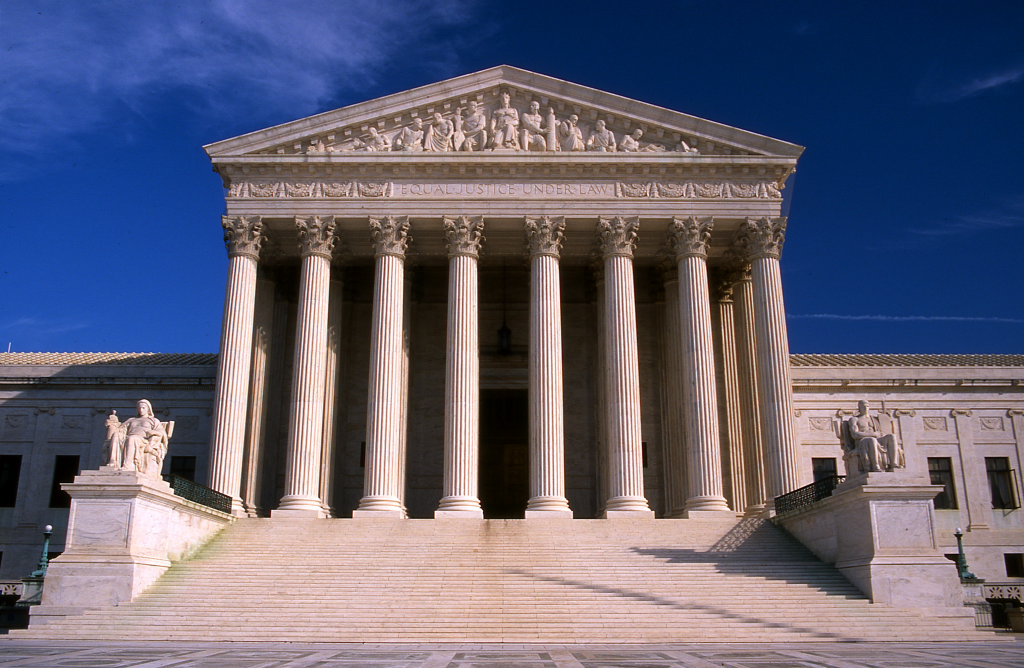
The U.S. Supreme Court is poised to abolish reproductive freedom. A leaked draft opinion in Dobbs v Jackson Women’s Health Organization would overturn the two precedents, Roe v. Wade and Planned Parenthood v. Casey, which recognised the right to an abortion in the US Constitution.
Underlying the opinion is a case about a Mississippi law that banned all abortions after 15 weeks’ gestational age. The finer points of the law are irrelevant – it was passed as a direct challenge to Roe and Casey.
The leak itself is unprecedented, but trivial next to the court’s reversing of five decades of law to abolish a crucial right. Every other time the Supreme Court has overturned major precedent, it has done so to expand human rights – to end racial segregation, for instance. But now, the conservative bloc on the court is set to drag America back half a century. Even if the leaked draft is diluted for the final opinion, it will send shockwaves through America’s understanding of its Constitution.
Reproductive freedom is religious freedom
Abortion bans are an attack on religious freedom. They attempt to impose one religious viewpoint on all of us. Religious freedom demands the right to an abortion so people can make their own decisions according to their own principles. The First Amendment to our Constitution prohibits the government from imposing one set of religious beliefs, or religion at all, on others, but that is undeniably what these bans do.
‘How is your interest,’ Justice Sonia Sotomayor asked the lawyer for the state of Mississippi, ‘anything but a religious view? … when you say [abortion] is the only right that takes away from the state the ability to protect a life, that’s a religious view, isn’t it?’
The attorney struggled to answer Sotomayor’s question, because she is correct. Legislation and legal briefs and opinions are scrubbed of religious language – Alito’s leaked opinion begins and ends with the camouflage, saying abortion presents a ‘moral issue’ and ‘moral question’ – but the lightest scratch rips through that thin veneer. Our organisation, Americans United for Separation of Church and State, explained the underlying religious impetus to the Supreme Court in our friend-of-the-court brief, using the legislators’ own words.
The sponsor of the Mississippi law in this very case justified the measure in part by declaring that ‘children are a gift from God.’ When the law was challenged in court, she asked her followers to ‘pray that these judges know that at three months of life these babies feel pain and deserve the life that God has given them.’ When Alabama’s Governor signed a similar anti-choice bill into law, she declared that the law ‘stands as a powerful testament to Alabamians’ deeply held belief that every life is precious and that every life is a sacred gift from God.’ The sponsor of a near-total ban on abortions in Arkansas justified the measure in the state Senate by arguing that ‘there’s six things God hates, and one of those is people who shed innocent blood.’ When Oklahoma enacted its ban, the president pro tempore of the state Senate enthused, ‘all life is precious and a gift from God,’ while other legislators said things like, ‘God values life and so do I,’ and ‘we thank the Lord for the team of people that worked together to help make this happen, and the multitudes who have prayed for years about this. We also thank the Lord for answered prayer. To God be the glory!’
Justice Alito’s draft opinion employs similar beliefs, always masked, to justify the destruction of Roe and reproductive freedom. Throughout his draft opinion Alito suggests that abortion is a special case because it ends a life. He tries to argue that ‘abortion is fundamentally different’ from freedoms such as ‘intimate sexual relations, contraception, and marriage.’ Why? ‘Because it destroys what [Roe and Casey] called “fetal life” and what the law now before us describes as an “unborn human being.”‘ In other words, like the legislators, Alito premised his opinion on a religious belief.
Wielding that religious belief to abolish reproductive freedom is unpopular: around two-thirds of Americans support keeping Roe v. Wade in place and that number is growing. Imposing religion through the law is also unpopular: only 13 percent of Americans think the government should ‘advocate Christian values’. And while there is some disagreement on abortion, it was not, for most of American history, a deeply divisive religious issue.
Anti-abortion then
Roe v. Wade was not controversial at the time it was decided. As Rachel Laser explained in her speech before the Supreme Court when this case was first argued: ‘When Roe v. Wade first came down, even the Southern Baptist Convention celebrated the decision as one that advanced religious freedom.’ In 1973, the Baptist Press concluded a story on the decision with this: ‘Religious liberty, human equality and justice are advanced by the Supreme Court abortion decision.’
So what happened? How did a religious denomination go from ‘religious liberty, human equality and justice are advanced’, to passing resolutions for ‘abolishing abortion immediately, without exception or compromise’ and likening reproductive freedom to a ‘holocaust’, as the SBC has done?
Abortion was chosen as a political wedge issue by a group of white, conservative Christian men in 1979 as the issue that could divide the electorate and secure political power. Andrew Seidel retells the story in his new book, American Crusade: How the Supreme Court is Weaponizing Religious Freedom.
Paul Weyrich, a Catholic who founded the Heritage Foundation with money from the Coors brewing empire, along with Jerry Falwell, a Southern Baptist mega-preacher and founder of Liberty University, and others, deliberately sought to unite segregationists, racists, conservative politicians, white politicians, southern politicians, and conservative Christians in a political mission. Bringing together their mailing lists, media streams, and access, they forged a new alliance in the fires of racism with the aim of maintaining segregation. Later, they would choose abortion as their wedge issue, not for its moral dimension, but for its power to motivate and unite followers under a religious banner that could not be questioned. The Religious Right and the ‘Moral Majority’, Weyrich’s term that Falwell latched on to, were born.
Why did these men meet in the first place? Not because of abortion, but because of segregation. When the Supreme Court declared segregated schools unconstitutional in the Brown v. Board of Education case in 1954, segregationists responded by opening private religious schools that remained racially segregated. Growth of those schools exploded and undermined desegregation efforts to the point that the government began questioning the tax-exempt status of these ‘segregation academies’. The government correctly observed that segregation is not charitable work and therefore not eligible for the tax exemption extended to charitable organisations. So the men gathered that day were not just fighting for segregation, but for segregation free of consequences, including taxes. They were battling a demographic wave and the steady march of equality, and chose abortion as the tool to retain and reclaim conservative white Christian privilege because it was more palatable than racism.
Anti-abortion now
When the dominant demographic feels its status threatened, it turns to ever more extreme measures to retain that status. This is known in academic circles as ‘Dominant Group Status Threat’. And the American dominant caste has been on the wane lately. According to PRRI, ‘as recently as 1996, almost two-thirds of Americans (65%) identified as white and Christian’ but by 2017, that number ‘was down to 43%’. Some experts predict that whites will no longer be the majority around 2045. We have had our first black president, and a woman of colour is now vice president. And over the last 50 years women and LGBTQ people have asserted their equality.
Then, as now, members of this formerly dominant group are raging against the dying of their privilege. Reeling from the first black president, marriage equality, the #MeToo movement, and changing demographics, their desperation has grown and they have turned to ever more anti-democratic and authoritarian ‘saviours’: Trump and white Christian nationalism. We saw this desperation boil over on the insurrection of January 6, 2021, in which Christian nationalism played a major role.
It is no coincidence that the rise of Christian nationalism over the last few decades coincided with the attacks on abortion rights. Abortion was a wedge, one that turned personal issues in shades of grey into articles of faith that were not just black or white, but life or death. The more religion was mixed with politics to increase that political wedge, the more Americans began to identify with Christian nationalism.
Nowadays, anti-abortion views and white Christian nationalism substantially overlap. Sociologists Sam Perry and Phil Gorski recently explained this connection in their op-ed about the racist who murdered ten people at a grocery store in Buffalo NY: ‘The majority of those [White Americans] with the strongest antiabortion views also want to impose their vision of a Christian nation on other Americans.’ Or, as they wrote elsewhere in that piece, ‘for a segment of Christians, the battle over abortion is just one front in a wider war to make America Christian again — by any means necessary. They are not pro-life so much as pro-control.’ The flip side of that need for control is a fear of loss: loss of status, loss of privilege. That breeds the racism inherent in white Christian nationalism. For instance, Perry and Gorski point out that the murderer’s manifesto regurgitated a racial replacement theory: ‘Combined with a menacing “invasion” of non-White immigrants, low White fertility rates, he warns, “will ultimately result in the complete racial and cultural replacement” of Whites.’
White Christian nationalism will not be satisfied with abolishing reproductive freedom, precisely because its ultimate aim is not to protect the sanctity of life, but rather to establish by law a special favoured class and turn everyone else into lesser citizens.
Alito’s draft opinion reads like a hit list for other critical rights. The opinion itself also amounts to a method of execution for those other rights. Christian nationalists will use the opinion as written to restrict and abolish personal liberties, including racial justice, LGBTQ rights, and contraception. Even if Alito’s final opinion is amended, the draft opinion lays out the conservative justices’ thinking on those other rights, and religious extremists will use it to justify new laws and litigate cases. They will give Alito another chance to make his draft a reality.
The question is not whether they will do this, but how far they will go. Overturning Roe is a major milestone on Christian nationalists’ decades-long crusade to impose their will on every American. But that crusade has shown itself ready to take lives and topple our democracy in the pursuit of power. In this sense, the end of Roe is also just the beginning.
America needs a national recommitment to the separation of church and state
Reproductive freedom is religious freedom. This draft opinion flouts the separation between religion and government demanded in the US Constitution. That separation prevents religious extremists from realising their Christian nationalist dream and has been a major roadblock for opponents of reproductive rights.
America promises everyone the freedom to believe as they want, but our laws cannot allow anyone to use their religious beliefs to harm others. That is why Americans United for Separation of Church and State brings together people of all religions and none to fight in the courts, legislatures, and the public square for freedom without favour and equality without exception.
Justice Sotomayor asked another question during oral argument that has stayed with us, a question about the court itself: ‘Will this institution survive the stench that this creates in the public perception that the Constitution and its reading are just political acts?’
It is a question that Americans need to confront, because this court is dragging our country closer to the white Christian nation some religious extremists so desperately desire. But we at Americans United for Separation of Church and State will fight not only to defend the wall of separation, but to rebuild it. And we will never give up.
In lieu of payment for this article and as requested by the authors, the Freethinker has made a donation to the National Network of Abortion Funds.


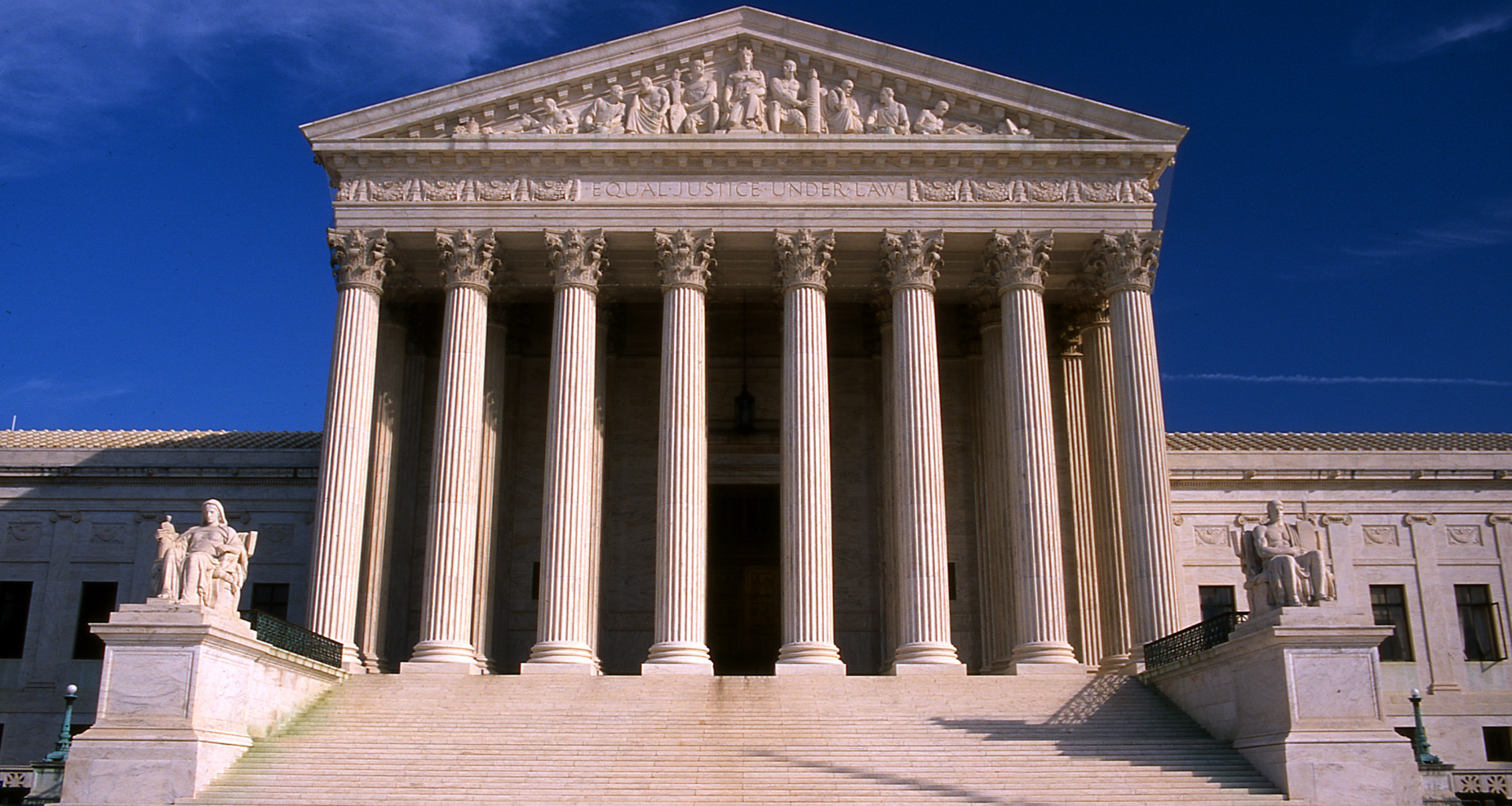


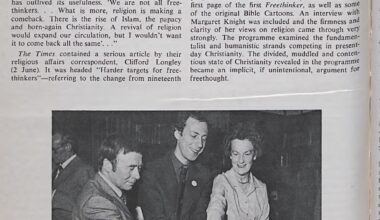

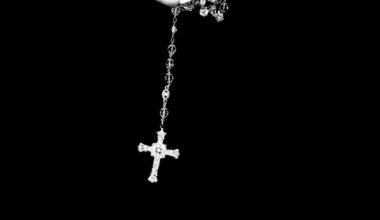
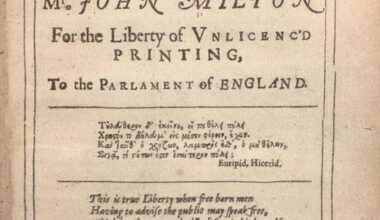
1 comment
American women are renowned for their feistiness. I like to think that if Roe v Wade is indeed fully overturned they will take to the streets in their millions to show that oppressing women Taliban style has no place in freedom loving America.
Your email address will not be published. Comments are subject to our Community Guidelines. Required fields are marked *
Donate